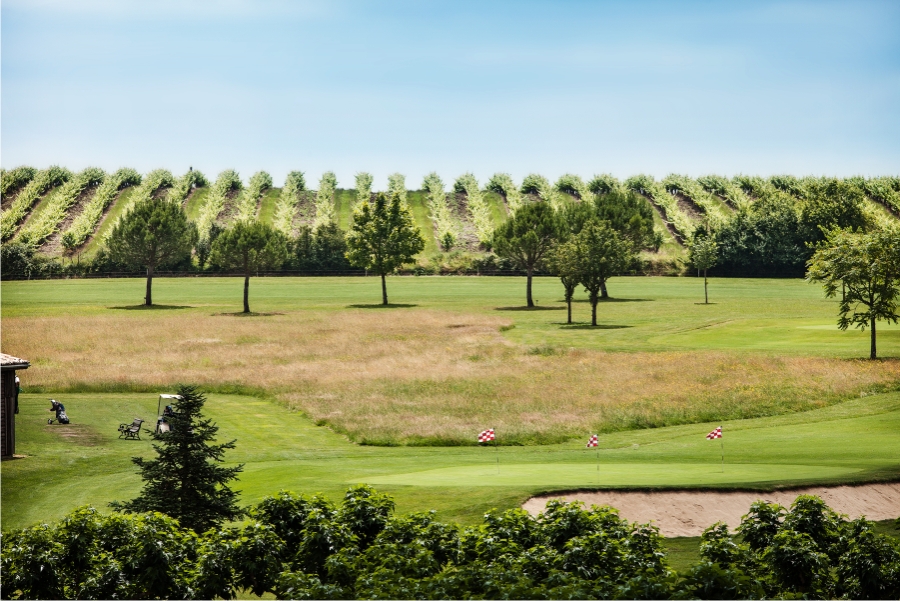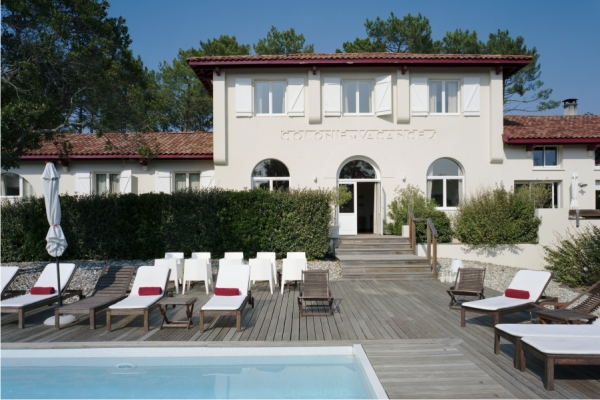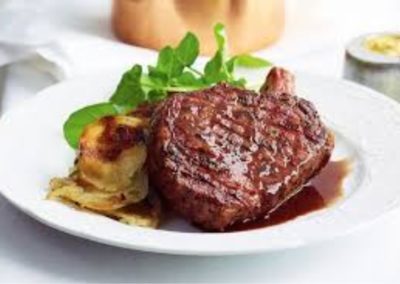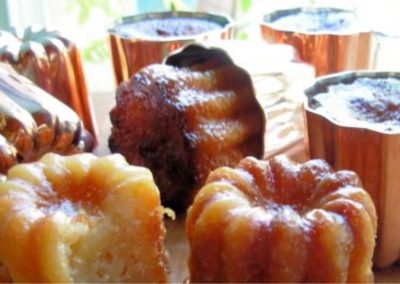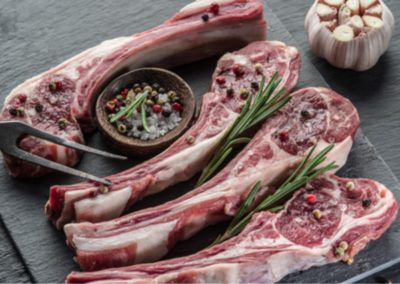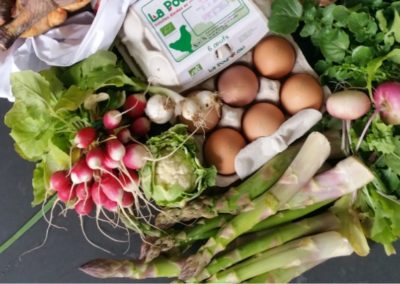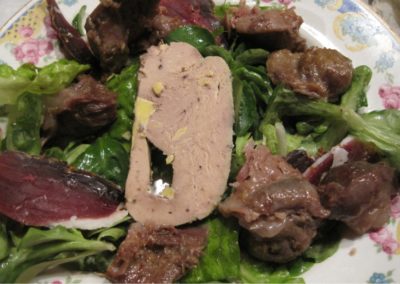Fine Gastronomy for Foodies
Here are local culinary specialities and local produce from Medoc to Biarritz
Culinary Specialities
Foie Gras
This is undeniably the king of festive tables. Whether raw or semi-cooked, cooked or pan-fried, this delight, appreciated throughout the planet, is one of the most beautiful culinary riches of South West France.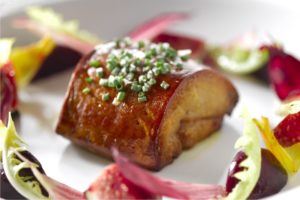
Potato Pie
Potatoes are cut into strips, a little garlic or shallot, pepper, parsley and a good dose of fresh cream fill a brioche dough. Result: a beautiful pie that is savored as a main dish or starter. It is ideally accompanied by salad.
Piperade
Tomatoes and peppers (preferably Espelette pepper) are the basis of this vegetable dish. Onions, peppers and sometimes eggs are usually added. It can be enjoyed very well with Bayonne ham and/or cheese as well as red wine.
Rocamadour
This is a goat cheese, Certified Origin since 1996, which is recognizable by its creamy paste. It is eaten both dry and fresh. If cooked well on its own, this cabécou can be melted on apples and salads, or enter the preparation of fresh salads or almonds.
Canelés
It is a small cake in the shape of a cylinder whose soft dough is flavored with vanilla, sometimes with rum. The striated crust is generously caramelized.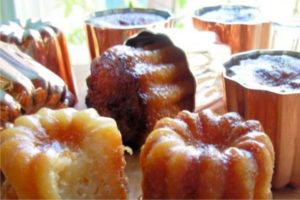
Liquors
The South West is a paradise. Liquors of nuts, plums and orange; there is something for everyone. The multiple varieties are appreciated as digestive or integrated with cocktails going from the softest to the most explosive.
The Armagnac
This eau-de-vie is obtained by distilling dry white wines. It is best eaten at the end of meals, in glasses with closed neck to preserve the smell to the maximum when it is old. White Armagnac drinks are rather fresh, whether pure, elongated or served with a few ice cubes. It is also used in marinades, pastries and preserves. Armagnac is sometimes used to flavor desserts or traditional dishes.
The Arcachon Oysters
While oysters from Arcachon Bay were already being savoured in Roman times. Today, the bay has 26 oyster farms, and about 700 acres of oyster beds that produce 8,000 to 10,000 tonnes of Pacific cupped oysters per year. There are four oyster-farming areas, Le Banc d’Arguin, Le Cap Ferret, Le Grand Banc and L’Île aux Oiseaux, all with different flavour palettes. Don’t miss out the Oyster festival!
Bayonne Ham
Recognizable by its very dark red flesh, it is native to the Adour area. Its success has been inexhaustible since the twelfth century. It is found mainly in appetizers because this tasty ham is enjoyed cold.
Cassoulet
Cassoulet In this part of France, white beans are traditionally cooked in a pot of clay. This only enhances the flavor already guaranteed by aromatics and rind as well as many varieties of meat.
Axoa
Made from a minced veal or beef, this dish is made with different spices and onions without forgetting the pepper.
The Bordeaux Wines
This wine can be proud of its worldwide fame. Red or white, Bordeaux is available in local bars and restaurants but can be tasted even better at home, with friends or family, at aperitif, lunch or dinner.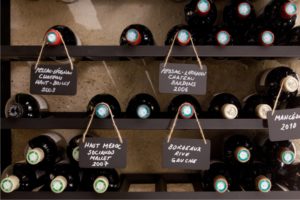
La Garbure Landaise
This traditional peasant soup is a tasty mixture of cabbage leaves, beans, sausages, rind, Bayonne ham, beans, turnips, carrots … A real treat!
Espelette Pepper
The flagship product of Pays Basque, this pepper is found in many recipes from the South West of France (axoa, doe, dumplings and chicken). It is sometimes marketed in canned (marinated in olive oil or vinegar), in the form of jelly or mashed potatoes.
Lamproie à la Bordelaise
It is one of the best classical dishes in Bordeaux cuisine. Lamprey is a type of big sea-snake, reminiscent of an eel, found in waters off the Atlantic coast of Europe. It is eaten primarily in the Bordeaux region of France and in parts of Portugal. Lamproie à la Bordelaise is cooked in its own blood with red wine and stewed with leeks.
Pauillac Lamb
Pauillac Lamb is a lamb whose raising methods have been protected by law in Europe under its PGI status, which was received in 2003.
The lambs are supposed to be both born and raised in the Gironde area (“Agneau né et élevé en Gironde”) according to the EU PGI certification. Pauillac is a small village in the Haut-Médoc region in the Gironde département. The lambs are born and raised beside their mothers on the same farm. They are kept with their mothers for 60 days, and consume only their mother’s milk, making them part of the category of lamb called “Suckling Lamb” (or “agneau de lait” in French).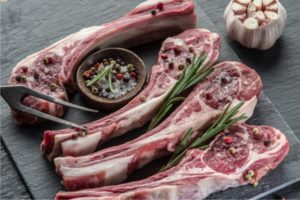
Duck Breast
This meat tenderloin is often cooked in fine slices, dried or broiled. It is also found smoky but most of the time it presented bleeding or pleasantly rosy on the tables. Serve with a glass of red wine.
Landaise Salad
It’s a perfect mix of hot/cold. For the warm, we find the famous breast of duck, gizzards and/or aiguillettes. When cold, apples, asparagus, tomatoes and cucumbers are used. A few herbs and foie gras are never too much.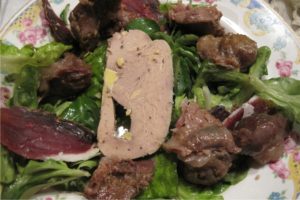
Boudin with Chestnuts
Chestnuts are not a separate ingredient in a pudding recipe. They are chopped into bread and added to a generous portion of meat to make an excellent black (sometimes white) pudding.
La Flaugnarde
This dessert is neither a pie nor a flan but it looks quite like it. Its preparation requires pippin apples, fresh cream and milk, oil or butter, eggs, flour and of course sugar.
The Basque Cake
This cake used to be set aside for special days. But today, the Basque cake is eaten without moderation. The tradition is that it is filled with cherry or pastry cream.
The Jurançon Wine from Les Landes
This white wine can be sweet or dry, to choose according to preferences. It is a perfect accompaniment to river fish and goat cheeses such as Rocamadour. Its tasting is recommended as an aperitif, served with foie gras. It keeps between 7 and 15 years.
Asparagus
Our region’s loose, sandy, mineral-rich soil and warm growing season produces white asparagus reputed to be one of the best in France. It’s a ritual here to eat the first local white asparagus in Spring. They are best eaten on their own with an oil and vinegar sauce after boiling them to tender.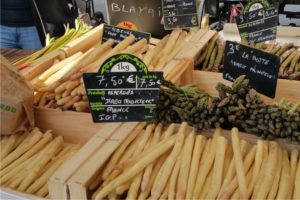
Cèpes
Cépes are big mushrooms known as penny bun, porcino or cep. Very expensive – around 25 Euros for 1 kilo or a little over 2 pounds – are very appreciated in the South west France. They make beautiful side dishes prepared with garlic and parsley.


